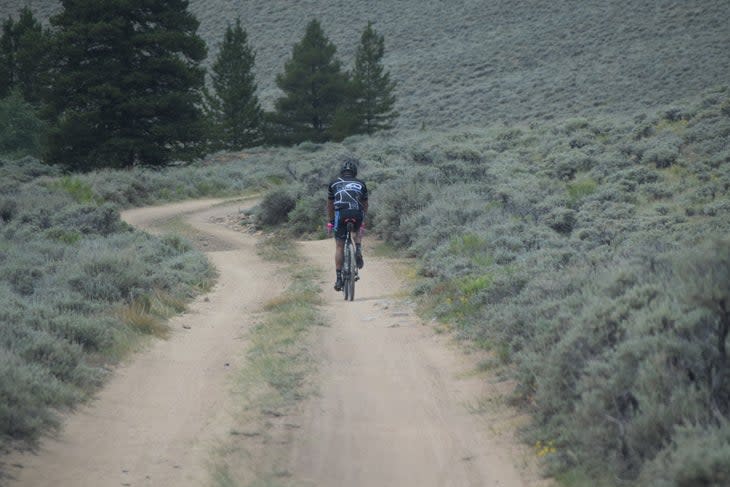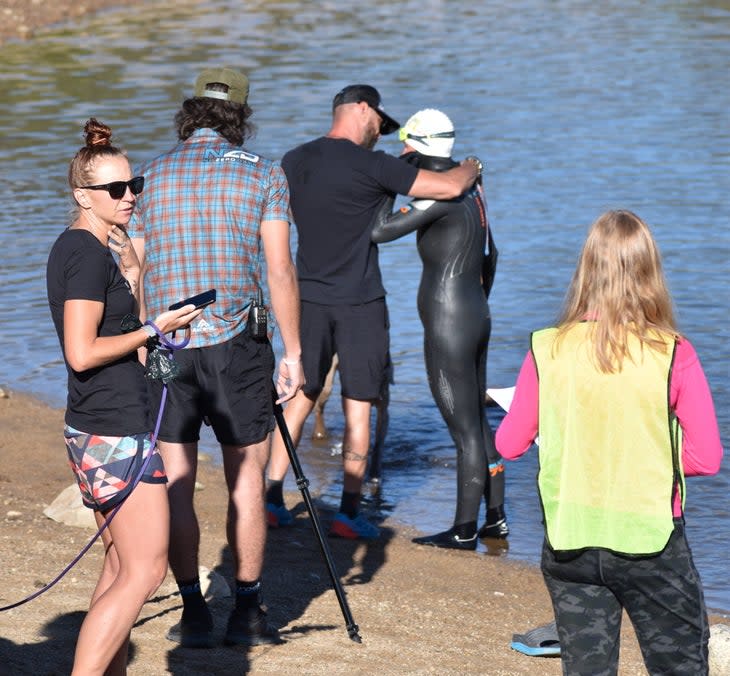The Hardest Triathlon You’ve Never Heard Of
This article originally appeared on Triathlete
Spring 2020: The COVID-19 pandemic is raging, and event directors are shutting down races left and right. Tri teams have stopped working out together, and masked athletes are keeping an uneasy distance on their favorite trails, leery of invisible microbe clouds trailing behind the runner or cyclist ahead. Some triathletes persevered, gravitating to more solitary pursuits like gravel cycling. Others packed it in, suspending their goals for an unknown post-COVID future.
Sam Piccolotti went a different direction. Unable to race in the endurance events he loved, the longtime endurance athlete and Ironman competitor decided to create his own full-distance triathlon. But this wouldn't be just any old triathlon. Spurred by audacious goals and pent-up race energy, he wanted a challenge worthy of his longtime idol, the legendary mountain man Jeremiah Johnson.
A gregarious 58-year-old software executive from Castle Rock, Colorado, Piccolotti looks a bit like a mountain man himself, with a bushy beard, wind-weathered face, and that far-away squint one acquires after countless hours above treeline. Built like Lionel Sanders - barrel-chested and powerful - Piccolotti grips new acquaintances with a crushing handshake and pulls friends in for bear hugs that take your breath away.
Once you feel his energy, you understand why Piccolotti felt compelled to create something big and exciting to fill the racing void. He started mapping a triathlon that would be tough enough to satisfy his need for an epic fitness challenge and adventurous enough to give it a sharper edge than the usual pavement-bound Ironman. Piccolotti set his sights high - literally - by sketching out a course near Leadville, Colorado, that would take place entirely above 10,000 feet and largely off-road.
RELATED: DIY Tri: Get Inspired to Put On Your Own Triathlon Adventure
A very bad, very good idea
But if it's easy to appreciate Piccolotti's passion, it's also fair to question his sanity. Most well-adjusted sea-level humans would quickly run screaming from a 140-mile backcountry race at high altitude. And rightly so: Merely ascending to 10,000 feet challenges many of the body's systems, as reduced air pressure leads to lower oxygen saturation in your bloodstream. People who aren't acclimated to altitude typically experience headaches, nausea, fatigue, and other mild symptoms when visiting Leadville, which is why shops all over town are well-stocked with miniature oxygen canisters. Scientists estimate that 40% to 50% of sea-level dwellers will suffer from acute mountain sickness, a condition that can lead to life-threatening illnesses like pulmonary and cerebral edema.
Fit athletes tend to adapt better, but the exertion of an iron-distance triathlon can offset that benefit for even world-class athletes - genetics play a role in your ability to acclimatize. Add the effects of cold temperatures and Colorado's extremely arid environment, and Piccolotti's plan is the kind that should (and does) come with all-caps warnings and a serious liability waiver.
RELATED: The Complete Guide To Extreme Triathlon

The race of a lifetime
Fast-forward to August 8, 2020. Race day is finally here. Piccolotti has been hiking 14,000-foot tall ranges, mountain biking, and trail running. He's fine-tuned the course, his gear, and his strategy for conquering the biggest physical challenge of his life. With his son providing race support, he wriggles into his wetsuit and cap for the swim leg that will kick off his big day. Yet there's a question of whether the single layer and no booties will be enough protection for the frigid waters of Twin Lakes, which barely top 50 degrees Fahrenheit.
Piccolotti had faced some tough times in his life, and is blessed with a special resilience, but the swim nearly ended his attempt. Despite his years as a competitive swimmer, the frigid lake quickly slowed his pace and dropped his core temperature. By the time he emerged, hypothermia had set in hard. In a video shot by his son, Nico, Piccolotti stumbles out of the water, shivering and uncoordinated.
"The hypothermia was scary," he recalls. "Even though I was trained in whitewater rescue, I had never been in that physical state before, and it took me two hours to recover."
Fighting doubts, Piccolotti refueled and mounted his gravel bike. Of the 138 miles left to ride and run, 80 would follow dirt, and he'd top out at a lung-busting 11,400 feet on the bike course. But despite sub-freezing nighttime temperatures and deep fatigue, Piccolotti kept a steady pace and credits his nutritional discipline for keeping his engine running.
It was never easy, of course. The lonely hours in the dark were the toughest. But as he traversed the spectacular alpine scenery, sweeping Rocky Mountain views, deserted aspen forest singletrack, and Leadville's iconic Powerline climb, he couldn't help but feel like the luckiest man alive.
Thirty-one hours after he started, Piccolotti crossed what might've been the most satisfying finish line of his life. The rugged terrain and cold conditions created much slower speeds than his average Ironman time, and he'd taken necessary stops to warm up, refuel, and rest. But a fast pace was never his objective. "When I went into this thing," he said, "the goal was to test myself mentally and physically in a way I had never done. It was really intimidating and uncomfortable, but I discovered so much joy and humility out there that I came to the end feeling overwhelmed by gratitude for being able to test myself in such a legendary place."
Video: Mountain Man Invitational
An epic challenge is born
Buoyed by his success - and what he learned about his own potential - Piccolotti attacked the next part of his dream: Getting support for making his newly-christened Mountain Man Invitational an official annual event.
But transforming a solo adventure to a full-fledged event is easier said than done. Piccolotti says the town of Leadville has been great to work with, but the wheels of bureaucracy grind slowly, especially when the federal government is involved via national forest permits. Despite that, he pulled off a test event last summer, hand-selecting two proven ultra-endurance athletes to validate both the attraction and the safety of the Invitational. The course was tougher, with more than 8,000 feet of elevation gain and even more off-road miles, but he also changed the swim so support crew could make a safety check at the halfway point.

Decorated endurance and adventure athlete Kathy Duryea was the sole finisher, but others came away enthusiastic. "The experience was everything I had hoped it would be," said Duryea. "It was challenging enough to require growth through pain, and exhausting enough to allow pause and reflection. I loved the essence of this event, the friendships forged with volunteers, and the personal journey taking place high peaks and epic scenery."
Will the Mountain Man Invitational return in 2023? Will it be open to anyone crazy enough to test themselves above 10,000 feet? At press time, Piccolotti is confident that he'll get permits for a July or August event, and he hopes to expand the field to 6-10 participants. For safety reasons, he's keeping the event small for now and will conduct an application process on his website, No Zero Days.
When asked what type of athlete he's seeking, Piccolotti focused not on specific skills or fitness attributes but on intangibles. "The depth of suffering and the elements at this altitude aren’t for the weak of mind or body," he said. "MMI is for athletes with endurance and mountain experience, but even more importantly the spirit and appreciation for what these challenges bring."
RELATED: Triathlon's 7 Most Brutal Bike Courses
For exclusive access to all of our fitness, gear, adventure, and travel stories, plus discounts on trips, events, and gear, sign up for Outside+ today.

